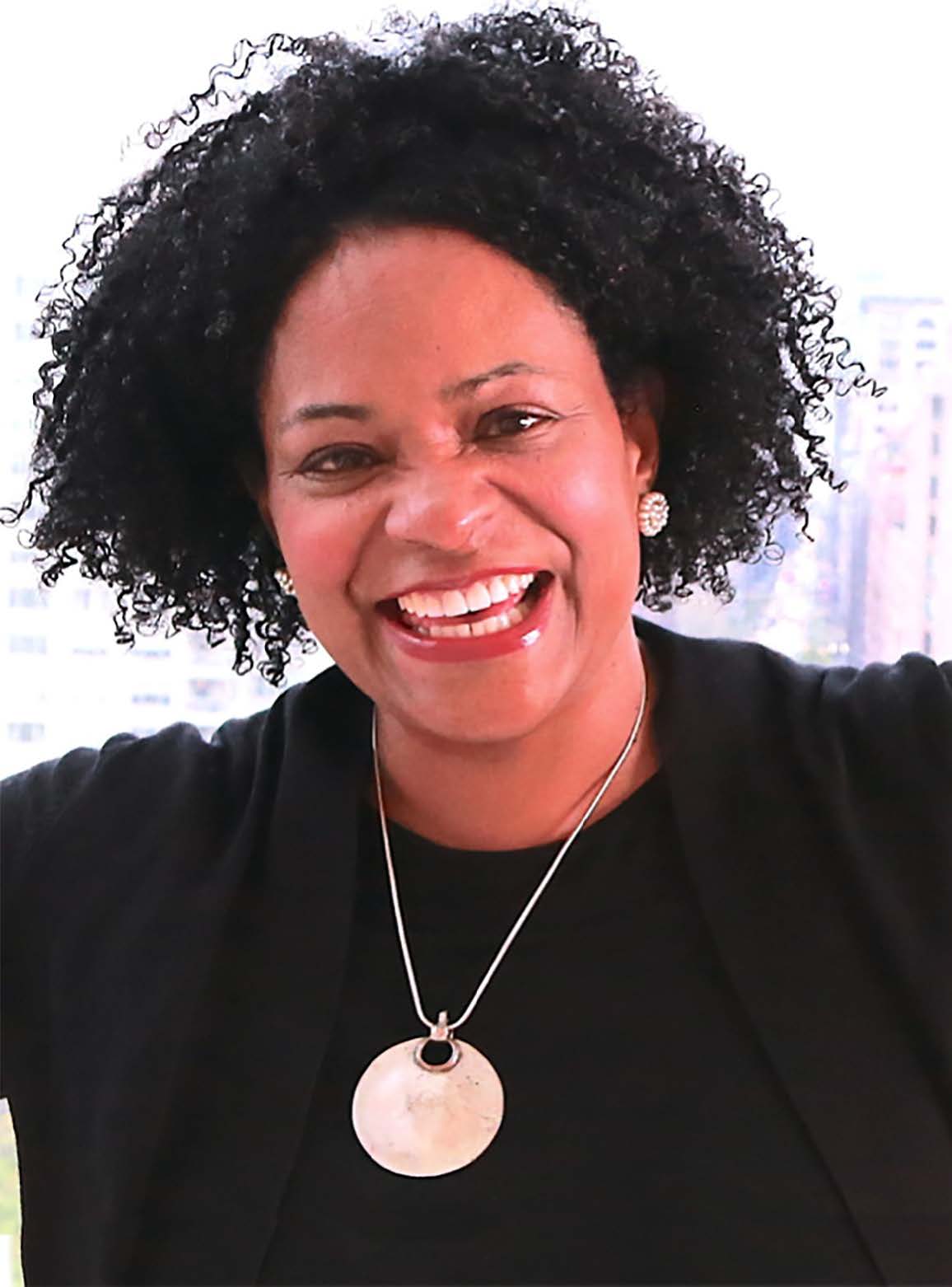
HIGHER CALLING: Dr. Lisa Coleman, Senior Vice President of Global Inclusion and Strategic Innovation at New York University
THEY CALL IT "HIGHER" EDUCATION
BY MICHAEL JOHN CARLEY
To be clear: This is an article… about my new boss.
Ok, it's also roughly about disability culture as it exists on most American campuses. But it's an unabashed tribute to my new employer, and by writing it, I'm daring and/or inviting readers to bludgeon me with multiple accusations of conflict. Bring it on. I'm a terrible liar, and at the very least, New York University's Dr. Lisa Coleman needs to be noticed. She is different, and she is succeeding – at creating sustained and transformational change.
The Baggage I Bring!
In my almost 20 years in this field – running non-profits, school consulting, writing – my dalliances with American colleges revealed their commitment to optics, the corporate bottom line, or to heartfelt but sadly ineffective gestures meant to offset the negative optics of… protracted neglect. While there were some notable efforts in design or implementation, at Marshall, for instance, or at a smattering of international schools, neurodiverse students generally feel kindly tolerated rather than valued on their campuses – supposed incubators of intelligence itself.
Too often, funding leftovers, thrown out by administrations to the luckier accommodations/Student Disability personnel, were advertised as successes to keep the vain hope alive that more would follow. "Here's $1,000 for a student event," "$2,500 for a (pretty limited) 'conference.'" Residential add-on programs for autism spectrum students (like old buddy Michael McManmon's College Internship Program) thrived, but at fees north of $50,000 per year that were/are in addition to tuition.
When I ran GRASP, then the largest membership organization in the world for adults on the autism spectrum, I believed, and thrived on a philosophy of "partner, partner, partner" (the verb). Regrettably most Disability Studies departments all over the coun Regrettably most Disability Studies departments all over the country couldn't be bothered to follow-up when I asked them to join us in such no-brainer alliances – removing words like "cure," battling emotionally-damaged vaccine theorists, or stopping the use of electric shocks on unsuspecting human beings in institutions. My outreach didn't get "no's. Mostly, they received silence from these surprisingly isolationist entities.
And, to debunk some myths, these disappointments weren't just at financially struggling, small schools. From my perspective, the wealthy universities were just as guilty, if not more, because they should know better.
Many schools are struggling, but we can and should feel free to question their priorities. For some, the highest their priorities. For some, the highest paid employee is the football coach, and perhaps (gag me) this is of real fiscal value for that institution. But universities must be more than a playing ground for athletes. These are sites of education, where values are cultivated and instilled, and as such must also act on the values that underscore innovation, and curiosity in diverse learning sites, for diverse learners.
To simply accept the excuse to discriminate or not fully support persons with disabilities due to financial limitations is to miss the opportunity to embed diverse learning values, systems, and related actions in our educational institutional practices.
Coleman: "Universities, like other institutions, can be incredibly risk-averse and far too often invention and experimentation is limited. Higher Educational Leaders must not simply rely on their expertise, but must also be curious, learners who take informed risks, and who highlight the important assets of diverse groups, people, etc. because we know from ample amounts of research that this is where innovation will thrive.
Dr. Coleman
Lisa Coleman is NYU's Chief Diversity Officer (CDO) and she leads their Office of Global Inclusion and Strategic Innovation (OGI), of which I am now a grateful team-member. The office works not only with NYU's New York City campuses, but across all of their global sites, including Shanghai, and Abu Dhabi. Coleman is not a CDO who is only focused on "race and gender." She is well versed in American Sign Language (ASL). She has lived and traveled exten sively all over the world. Her department's core personnel are filled with not only influential women and scholars of color, but also a much higher percentage of LGBTQ+ leaders than similar departments at other schools. She is respectfully teased for having many friends in their 80s. She regards income discrepancy as one of the major factors that plagues the world. Her approach is global and intersectional. In short, she's real D&I.
Coleman grew up in mid-sized cities in Cuyahoga County, Ohio. Neither rich nor poor, she was a child to a company manager father and a computer scientist mother, the latter of whom made it a conscious or unconscious point to surround her with powerful adults. Coleman was also partially raised by a grandmother, a former NYC and Chicago jazz pianist who lived to be 98, and who lived with them off and on throughout her childhood. As a teenager Coleman learned her ASL working at the Alexander Graham Bell School for the Deaf (whose Principal was a friend of Coleman's mother). Through her volunteerism as a younger person she worked with several women's organizations and homeless shelters, wherein the issues of income disparity and socio-economic disenfranchisement would greatly influence Coleman's outlook.
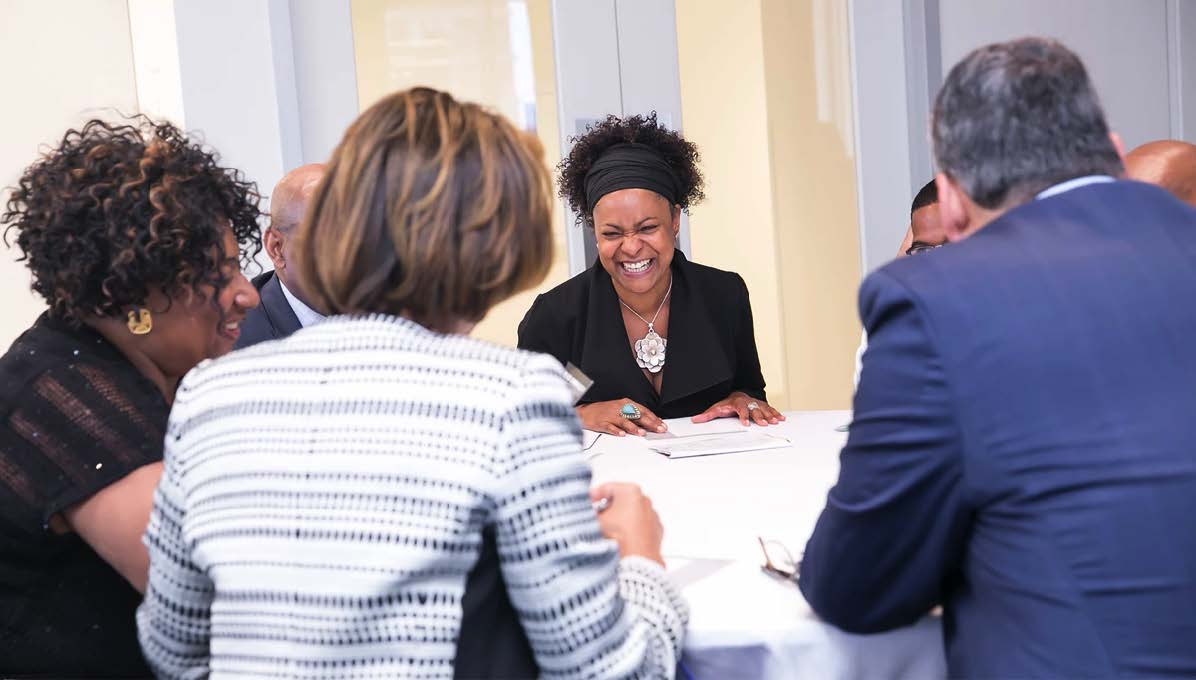
TURNING THE TABLE: "Dr. Coleman will not be silenced by previous, near-universally-accepted protocols. She will do the hard work, listen, and then act in support of those most in need. This is what she just seems to do, and she knows there is much more to be done."
"I've always had a lot of questions and so in my teens I inquired repeatedly about why things are the way they are. So, it was like a wake-up moment… Things I had been told though various systems of education about 'the homeless' had been a little bit of a lie. No one wants to live impoverished and on the streets!" Now, at NYU she has created a new consultancy role (COVID-permitting, soon to be a Directorship) focused on global disability inclusion – Director for Disability Inclusive Culture. No institute of liberal higher learning on planet earth has created any such position so dedicated to the care – be it through issues of accessibility, or neurodiversity – of their disabled community. She, the post, and the institution, are that advanced.
Career
After various consultancies, faculty appointments, and some dalliances in the corporate world, Coleman launched her administrative career at Tufts University in 2000, first as the Director of the Africana Center, and then as the (2007) Executive Director of their Office of Institutional Diversity. Then in 2009 she left to become Harvard University's Special Assistant to the President and CDO, reporting directly to the first female President of the University. On both campuses she excelled. However, she states that there has been a great deal of evolution in the quality of the disability work that she implemented. "I started (my disability work) at Tufts, doing what would now be considered lower-level, compliance-oriented disability work (this was true in other diversity related areas as well) and this was about the time period, not so much about the institution. However even then something about that wasn't sitting well with me. I began to experiment a bit at Tufts, and when I got to Harvard, I was able to expand my experiments, and follow my curiosity to be more innovative and take some more risks to expand this work." There, she reached out and hired educational luminaries in the disability space, working with Harvard's engineering school she developed an app for the students with disabilities – her curiosity continues to allow her to explore, be proactive and inventive.
"It was then that I started really thinking more about innovation and what it means to BE innovative… And so [in late 2017] when I came to NYU, I realized this was about culture… not just about individual practice… If we're talking about universal access, universal design, design thinking and all those kinds of things... That's not going to happen simply through accommodations. That's not how it works. So, that is how we came up with this idea of Disability Inclusive Culture. And, yes, I do hope it changes the landscape for how we at universities and other types of organizations approach this work… because to serve our diverse populations and transform organizations we must take cues and learn from our multifaceted, intersectional, and varied communities, and that is not just about disability."
Coleman received her B.A. from Denison University majoring in Sociology and Anthropology with a focus in computer science, and her current NYU post is a homecoming to where she got her Ph.D. (in Social and Cultural Analyses specializing in American Studies). But her Masters degrees (in Women's, Gender and Sexuality Studies; African and AfricanAmerican Studies, and Communication Studies) came from Ohio State (OSU). I asked her if she remembered the 2009 controversy when then–OSU President, Gordon Gee, made the mistake of publicizing OSU's Autism Speaks affiliation, as well as supporting Autism Speaks' walk, farcically unaware of how loathed that organization is by scores of parents as well as the vast majority of people on the spectrum.1
"Oh yes!" she laughs, remembering quite well. "Gordon Gee was a great President in a lot of ways, but he also made mistakes, just like we all do… I've made a lot of mistakes.
1. asansouthwestohio.blogspot.com/2009/09/self-advocacy-at-ohio-state-university.html
There's very little forgiveness for leaders these days. (And because of that) I'm someone who was dragged kicking and screaming into leadership."
That said, she began to fall in love with a new mode of leading – questioning, learning – and it is then that she began to explore what inclusive leadership could look like. we can try to mind our own businesses, but often our businesses are interconnected because we live, learn, and work together." "I'm an interventionist. That's the whole point to being an inclusive leader. My default is transformational and educational, not punitive."
Though interventionism is a value I share with her, I challenged her, utilizing the biggest criticism that interventionists must always face – that intervening is often seen (by the "intervened") as a violation of the right to privacy. When we are interventionists we become meddlers, we do not "mind our own business," we get in there, we get involved in other people's affairs. Coleman was quick to respond: "We live and work in communities. Even as an innovator or entrepreneur we have to work with others, right?… Even if one is a quote unquote isolationist, the question becomes – who do you want to isolate with? So, yes, we can try to mind our own businesses, but often our businesses are interconnected because we live, learn, and work together."
"Sidebar, your honor? Some potentially inappropriate material has come up…"
The post that Coleman has created for Disability Inclusive Culture is also landmark for two other reasons; both of which people on the autism spectrum will cheer. One, a person with a disability was actually going to occupy this post. Two (and this is where the spectrum comes in, as other disabilities have made stronger gains herein…), the compensation package is equal to what is commensurate with the earnings of a neurotypical "expert."
Many people in the autism world know that I am not, shall we say, an inexpensive speaker. Of the small number of people on the spectrum who also work in the field, there is only one other person in the world who has the impudence to charge more.
I won't look at you, the reader, and tell you I deserve what I charge conferences, or institutions. But a crucial step in eliminating the negative stigma of neurodiverse folks like myself involves our experiences being valued the same as the world seems to value the neurotypical "expert." The bottom line, and not the "thank yous," is unfortunately where the proof of real appreciation often lies. I willingly lose a lot of speaking opportunities because of my firm negotiation policies (for instance, and because of their practices, I have twice fielded inquiries, but have never spoken for the Autism Society of America). And I admit that at times this is not a strategically-sound practice. Our lived experiences are of at least equal value to that (however wonderful) fellow speaker at the same conference — be it the clinical psychologist, or the brilliant scientific author. At most autism conferences, attendants now tend to report having learned more from speakers who are on the spectrum than from the others who take the podium. So sometimes there seems to be a disconnect when it comes to fair and equal compensation.
We all are aware that the answer has a lot to do with the market that exists, as opposed to the market people like me, others on the spectrum, and Dr. Coleman are striving to create. But I continue to engage in these practices because when I get a proper gig, I am then also able — not in gratitude, but in recognition — to freely praise the sponsoring organization, for they have demonstrated, in action, that my opinions and experiences, as well as those of others like me, are valued as much as they are of neurotypicals. I also have a responsibility, given how lucky I've been, to encourage other spectrum people to take themselves more seriously, and to understand that our time is worth so much more than we too often are taught to think.Coleman's new disability inclusion position (which yes, I now occupy) is important because a person on the spectrum is being compensated at the equivalent level to what the neurotypical PhD would have received. That said, it is also revolutionary because of the way these ideas are being embedded into the fabric of the institution. One may feel free to criticize the decision of who they hired, but not the innovative fairness of the post. That part is indisputable. ("Thank you, your honor. I'll continue again now.")
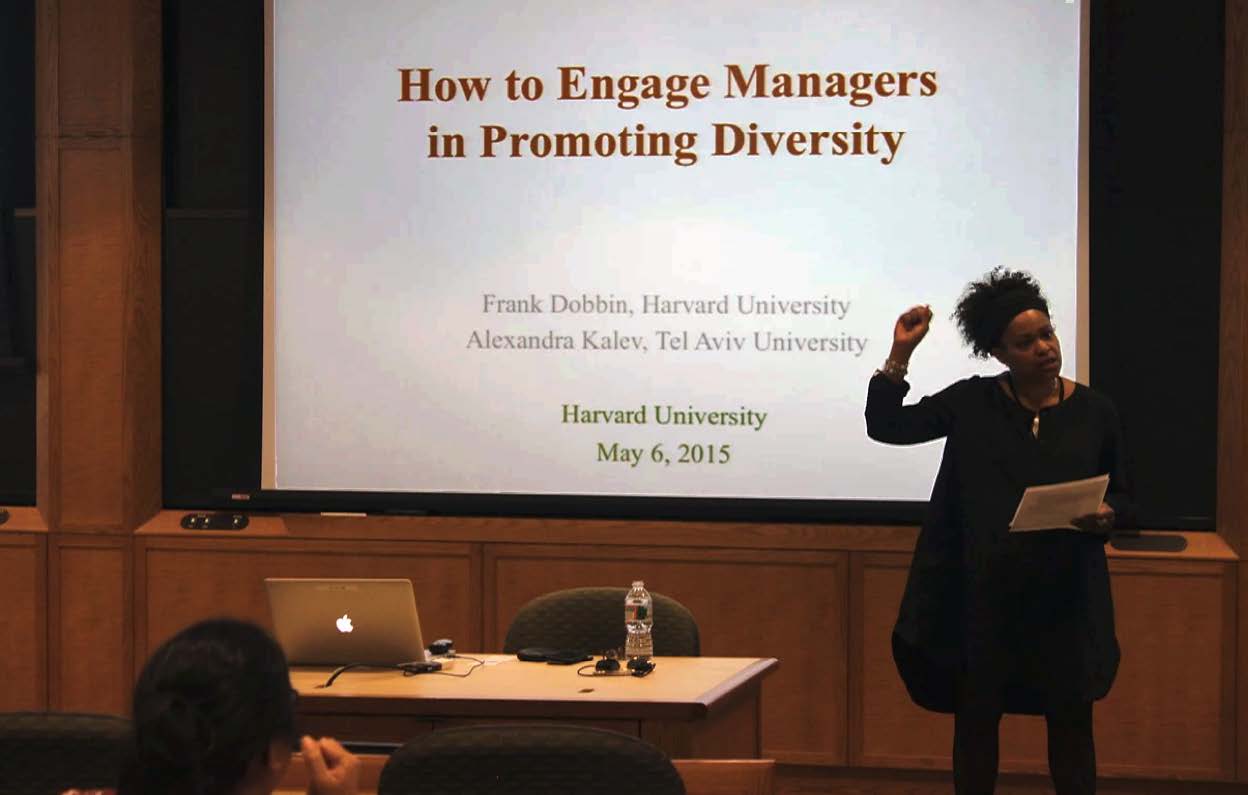
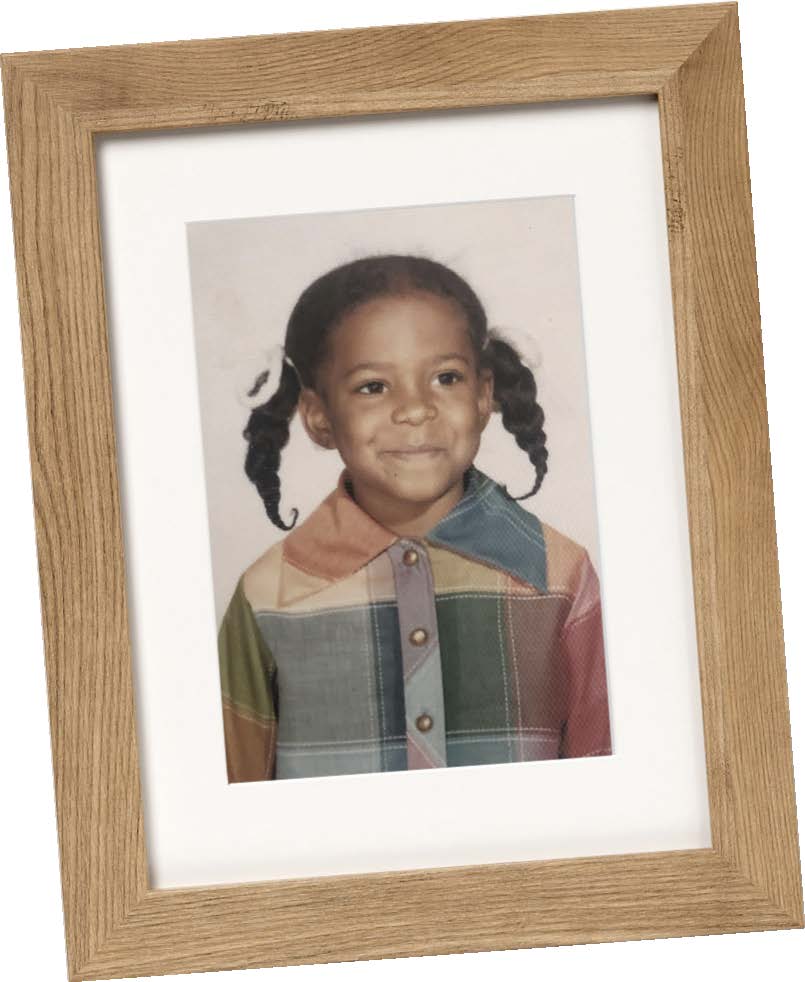
ASKING QUESTIONS: Dr.Coleman as a young girl (left) and (right) presenting at Harvard University. "When I got to Harvard, I was able to expand my experiments, and follow my curiosity to be more innovative and take some more risks to expand this work."
Dr. Coleman and Intersectionality
Many people want to do work related to inclusion, and some of us who need to do this work are lucky enough to find positions that are right in line with this necessity. But Coleman would not be Coleman without an administration that allows and encourages her to do this work. NYU supports the work, and they support her… with funding, resources, and a commitment to finding their way together when there is a challenge.
"[NYU] is marvelously innovative. That's one of the primary reasons I came here… they've taken it as they say – to the next level globally and locally. When I came in… I was very concerned with a lot of the issues brought to my attention with facilities and other accommodations, and making sure we closed the gaps, so initially I was paying attention to these areas. But that's not where I wanted to end – I wanted and continue to want to explore, imagine, and grow the innovative, the possibilities."
Referring to the Shanghai, Abu Dhabi campuses and the other sites across NYU, that Coleman's OGI also oversees, she confessed that it has not always been smooth sailing. "NYU went out into the global space at the same time these other universities either went out and failed, or some who simply said –'No; This is too scary.' And, even at NYU things weren't going perfectly all the time, but as an institution we were willing to experiment, to take measured chances, to learn from our mistakes, to iterate, test and develop new prototypes, new ways of being and doing. Whether that is in Abu Dhabi, Shanghai or any of our other global sites we are willing to take educated risks; and this is one of the differentiating factors that makes NYU unique; we are innovative, risky, entrepreneurial, global, inclusive and DIVERSE – in all of its meanings."
Topping off Coleman's innovative aura is a philosophy that the real and thriving D&I work can be effective only by embracing the concept/reality of intersectionality (when we occupy the space of more than one element of Diversity & Inclusion).
Now my ideas prior to consulting for NYU and OGI were a little different: I was raised on the concept that the intersectionality work could not begin until after you fully understood the implications of each element/space that you inhabit therein – the autism part, the queer part… like two people needing to be whole to give a new relationship the best chance at success. The "2" couldn't flourish unless both "1"s knew themselves well.
But in my early days I am already converted to Coleman's version: that while we do need full understandings of our blackness, our queerness, our disability – our historical marginalization, if not genocide, we also need to combine this understanding with the complexity of simultaneity. This is recognizing that some do not get to choose their race, gender, or disability one over the other because for them they are all these identities at the same time and one is not more important than another aspect of identity; they are all important.
It is often the outside world that tries to force choices or make one identity singularly more important than another. With this recognition we allow ourselves and others to embrace the inter sectional, the complex, and the innovative. To adhere to my prior notions is to forever put the intersectional possibilities, and all its potential learning, on a shelf, for "maybe at a better time." But there is no finish line when exploring the elements of who we are. There are simply unending possibilities to imagine fairness, equity, and inclusion… and our meager or great efforts to make it our reality. Coleman's equally brilliant team underscore this work in every aspect of what they do, having bought into her vision hook, line, and sinker. It is this element of Coleman's philosophy that paints the biggest picture. "When we are intersectional and focused on those most vulnerable… we can advance and build more universal capacity and encourage the creation of more equitable, more courageous and more action-oriented, inclusively innovative communities."
Conclusion
As one might imagine, given the recent protests across North America, Coleman has been understandably busy. As a person of African descent (Black person) and as the inaugural CDO of NYU it was important for her to write to the NYU community2 following the murder of George Floyd, if not also so many other horrific acts of violence, xenophobia, and discrimination.
But Coleman's statement was a little different... After a Google search of "statement on black lives matter," I took the first ten entries composed by companies and institutions within the last month. The ten statements averaged just under 500 words (499.22222): The longest statement was 660 words, and the shortest was 192 words.
Usually, statements such as these are drafted with lawyers, PR people, and adhere to a length that fully satisfies people with increasingly short attention spans. These statements, as I read them, are often written to not alienate potential sources of income, or customer/client bases. Some of the authorships actually state that they can "only go so far." These statements can then be read as conciliatory, or even contrarian obligations. Coleman's statement was 1189 words. It was contextual. It was historical, and contemporary. It was different.
The fact that the content within her statement was universallypraised is no surprise. She is a brilliant, established, higher-education thinker (and learner). It is her refusal to adhere to the safer length of this statement that separates her from her peers, that states loud and clear that she will not be silenced by previous, near-universally-accepted protocols. She will do the hard work, listen, and then act in support of those most in need. This is what she just seems to do, and she knows there is much more to be done.
2. nyu.edu/life/global-inclusion-and-diversity.html
NYU, like many others, has work to do, but it is far ahead of the "It's about new ways of doing and being. I know we are the assets. And WE are the future. The question is – are you, whoever you are, ready, for OUR future?" vast majority of institutes of higher education. Credit also extends to the top, with NYU President, Andrew D. Hamilton and the Provost, Katherine Fleming. But my personal admiration, awe, and appreciation is for Coleman's brilliant team; my new colleagues that include folks like Dr. Karen Jackson-Weaver, Monroe France, Sean Corlett, Leah Lattimore, Dr. Chandani Patel, Chris Woods, Christopher Paul Roberts Griffin, Dr. Autumn Rain, Tera Nakata, and partners across the University such as Dr. Faye Ginsburg, Karen Nercessian, Robyn Weiss, Kristie Patten, Mara Mills, and many others.
many others. One of Coleman's mottos is to work with "joy;" so it is also an environment that works so well with each other that to the newcomer it can feel intimidating.
However what is not only gratifying, but sometimes seemingly astonishing, is that they all seem quite open to integrating someone who does not read minds well, who uses dramatic language, processes thoughts, experiences, and emotions differently, and who asks them to mean what they say, and say what they mean. Is this what inclusive innovation and leadership might look like? The "reality" is that for many so-called progressive institutions – including D&I departments – D&I exists to solve a problem. Not for Coleman. For her, D&I is about our collective strengths, and embracing our interconnected futures together. Those dedicated to sustained D&I progress never defend a decision with statements such as "Well, the reality is that this is the way things are." Instead, they support the idea that "this is the way things can be."
Coleman goes further: "It's also about new ways of doing and being. We must be willing to try, and to maybe make mistakes, because the possibilities are endless if we bring together diverse communities and minds together atypically. Sometimes when people look at people with disabilities, or people who are gay, trans, or black… they look at us as their problems; as something that needs to be fixed. But I do not think that at all, I think (I know) we are the assets. And WE are the future. The question is – are you, whoever you are, ready, for OUR future?"•
ABOUT THE AUTHOR:
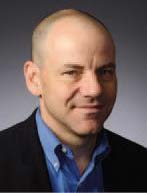
Michael John Carley is the Founder of GRASP, a school consultant, and the author of Asperger's From the Inside-Out (Penguin/Perigee 2008), Unemployed on the Autism Spectrum (Jessica Kingsley Publishers 2016), the upcoming Book of Happy, Positive, and Confident Sex for Adults on the Autism Spectrum… and Beyond!, and the column, "Autism Without Fear," which for four years ran with the Huffington Post. Currently he is the Consultant for Disability Inclusive Culture at New York University, a writer for many, and on Mondays he sees individual clients. For more information on Michael John, or to subscribe to his free newsletter, visit michaeljohncarley.com